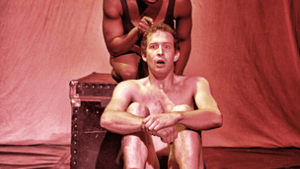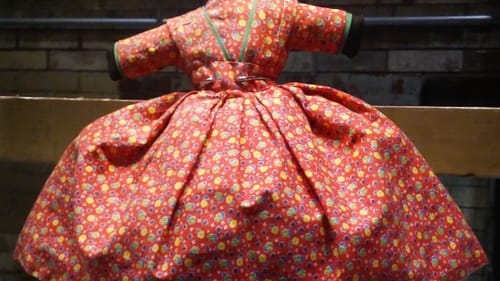Stay in the Loop
BSR publishes on a weekly schedule, with an email newsletter every Wednesday and Thursday morning. There’s no paywall, and subscribing is always free.
We need to talk: A call to action
Lightning Rod Special's reworked 'Underground Railroad Game' at FringeArts

Slavery's struggles may well be over, but an ongoing power struggle has followed us into the 21st century. Lightning Rod Special’s reworked Underground Railroad Game, presented by FringeArts, comments on this and other problems that exist between black and white communities through a medium that is all too often overlooked in such a diverse nation as the United States: interracial relationships.
The play introduces two characters: Caroline and Stuart, middle school teachers who create a game in which the students transport black slave dolls from classroom to classroom until they reach the “safehouse” — that is, if you’re in the Union Army, led by Teacher Caroline (Jennifer Kidwell). If you’re a member of the Confederacy (Teacher Stuart’s team), then your goal is to steal a doll from one of your Union classmates and put it in “jail.”
In the second scene, Teacher Stuart, portrayed by Scott Sheppard, directly addresses his “middle school” audience while explaning the rules of the game: “If at any time you feel uncomfortable, the code word is ‘Sojourner.’” I sat down next to my (white) date wondering just how uncomfortable it would get that night and, even more, whether anything I saw onstage would hit home.
The teachers’ gameplay demonstration leads to the revelation of what Underground Railroad Game is really about (the game, incidentally, is based on one taught at Sheppard’s real-life middle school). Teacher Stuart playfully tries to wrestle the doll from Teacher Caroline and, in the process, their struggle quickly evolves into a romantically lit tango sequence. This dance presents one of the play’s most humorous moments while effectively exposing the romantic tension between the two characters. The dance also symbolizes the power struggle that infects their budding romance and grows with it, ultimately building a wedge between the two that becomes impossible to eradicate.
Teacher and student
The couple’s power struggle develops in part due to the psychological differences between them. Kidwell and Sheppard create an excellent balance between superficial middle school teachers struggling to maintain a professional demeanor and two potential lovers who are only superficially attracted to each other and know absolutely nothing about each other besides the difference of skin color.
Caroline— black, independent, and direct— rarely conceals her feelings (especially sexually), often speaking exactly what’s on her mind. Stuart, on the other hand, is nearly the polar opposite, instead letting his thoughts seep out through microaggressions and Freudian slips. Caroline often has to finesse the truth out of him, whether through cunning wordplay or erotic roleplay. Stuart, plagued with white guilt, is subconsciously led by a messiah complex, and he clearly sees Caroline as more a thing to be saved, protected, and advocated for than a fellow human being to be loved. Caroline neither needs nor wants saving, and her independent attitude fuels her inner desire to dominate — “I once had a dream that I fucked Tom Hanks so hard he cried.”
Physical difference obviously plays a role. The two seem completely comfortable addressing their middle school audience on the topic of race, but when they’re alone, the subject only manifests in questions like, “What happens when your hair gets wet — does water just fall off of it?”
We need to talk about race
Underground Railroad Game addresses all the awkward peculiarities of interracial interaction without sounding cheap or even full of itself. Despite the play’s reputation for being raunchy and offensive, I found myself feeling exposed more than uncomfortable, and in an inexplicably good way; with so many relatable, valid observations being manifested before my eyes, I felt as if the play was written specifically for me, based on my experience with interracial relationships and friendships. But the truth is that it was written for everyone.
The message of Underground Railroad Game is this: We need to talk about race. Communication about race is rampant in the media, in history classes, and among politicians, where assumptions are made and the conversation is desperately one-sided. The reality is that when it comes to race, black people speak amongst themselves, and whites do the same. The community is lacking an interracial conversation. What it really needs is an intimate one-on-one between you and me, the real members of society, an open dialogue that directly addresses the things left unsaid between friends of varying colors.

After the show, when my date and I ventured into an adjacent room to explore the exhibit of black dolls (demonstrating the studies conducted by Kenneth and Mamie Clark in the early 1900s), I stood next to the display and pivoted to face him. “Which one do I look like most?” Laughing and pointing at a doll on the far left, he admitted, “Square eyes.” That is the kind of friendship we have.
Interracial friendships, relationships, and interactions can be successful. They have to be. We just have to have the courage to spark up a conversation.
What, When, Where
Underground Railroad Game. By Jennifer Kidwell and Scott Sheppard, directed by Sarah Sanford. Through Sunday, May 22, 2016 at FringeArts, 140 N. Columbus Boulevard Philadelphia. (215) 413-1318 or FringeArts.com.
Sign up for our newsletter
All of the week's new articles, all in one place. Sign up for the free weekly BSR newsletters, and don't miss a conversation.
 Trish McFadden
Trish McFadden